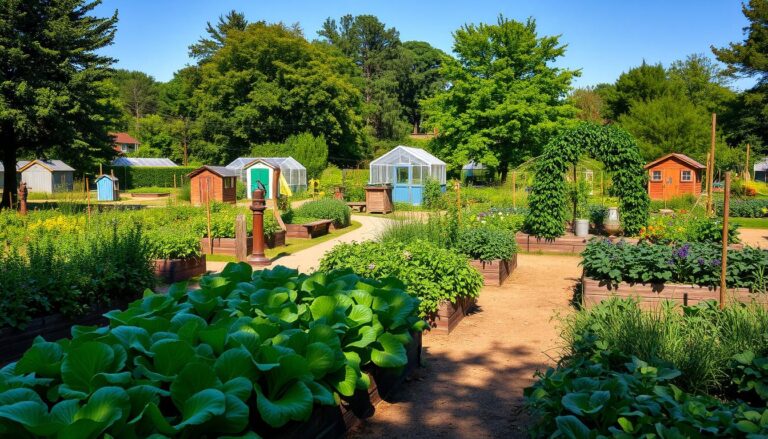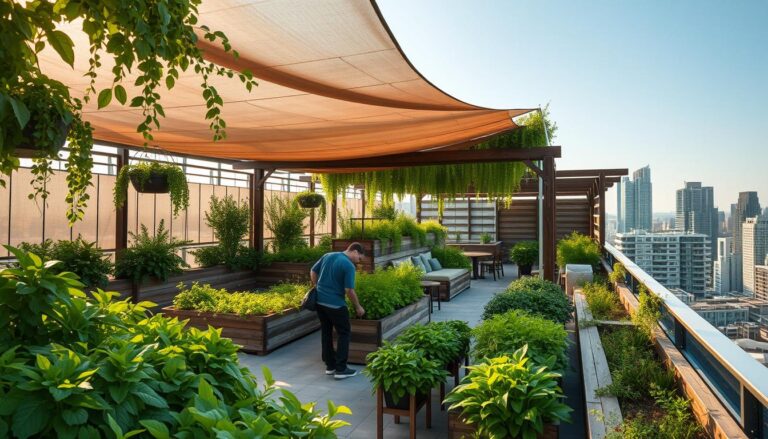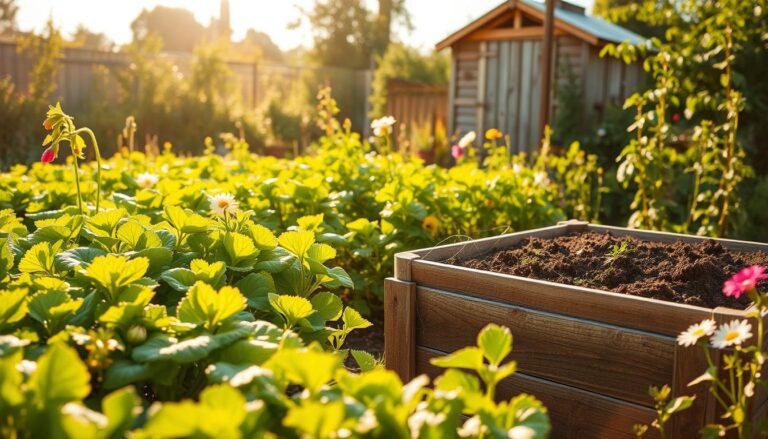Starting an organic garden is rewarding. It gives you fresh produce and helps the environment.
If you’re new to organic gardening, knowing the basics is key. This guide will cover the essential organic gardening tips to start your journey.
Follow these simple tips to create a sustainable and healthy garden. You’ll be on your way to a thriving garden.
The Principles of Organic Gardening
Organic gardening is more than avoiding chemicals. It’s a way to work with nature to create a healthy garden. This approach uses eco-friendly gardening techniques to improve soil, save water, and support many different plants and animals.
What Makes a Garden Truly Organic
An organic garden doesn’t use synthetic fertilizers, pesticides, or genetically modified organisms (GMOs). Instead, gardeners use natural gardening practices like composting and crop rotation. They also use natural ways to fight pests and keep the soil healthy.
Environmental and Health Benefits
Organic gardening is good for the planet and our health. It keeps water clean and reduces pollution. Plus, organic food is often more nutritious and has fewer chemicals, which is better for our health.
| Benefit | Description | Impact |
|---|---|---|
| Environmental Conservation | Reduced chemical use and pollution | Healthier ecosystems and water sources |
| Nutritional Value | Higher nutrient content in organic produce | Better health outcomes for consumers |
| Biodiversity | Promotion of diverse ecosystems | Resilient and thriving garden ecosystems |
Setting Realistic Expectations for Your First Season
Starting an organic garden takes time and effort. The first season might be harder as you build your garden’s ecosystem. Be ready to learn and adjust. Don’t get discouraged by early setbacks. With time, your garden will grow stronger and more productive.
Essential Organic Gardening Tips for Beginners
Starting an organic garden is a great way to live more sustainably. It’s not just about growing food; it’s about making your environment healthier and supporting nature.
Starting Small and Scaling Gradually
One key sustainable gardening tip is to start small. Begin with a small plot or a few containers. Then, grow bigger as you get more experience and confidence. This way, you avoid feeling overwhelmed and can learn from your mistakes.
Basic Tools and Supplies You’ll Need
To start, you’ll need some basic tools and supplies. You’ll need a garden fork, trowel, watering can, and organic seeds. Good, durable tools make gardening easier and more fun.
Planning Your Garden Layout
Good garden planning is key for a successful harvest. Think about sun exposure and space requirements when planting different crops.
Sun Exposure Considerations
Most plants need at least 6 hours of direct sunlight a day. Watch your garden’s sun patterns to place sun-loving plants right.
Space Requirements for Different Plants
Each plant needs different amounts of space. For example, tomatoes and squash need more room than leafy greens like lettuce and spinach. Proper spacing helps plants breathe and prevents disease.
By following these organic gardening advice tips, beginners can succeed and enjoy the benefits of organic gardening.
Building Healthy Soil: The Foundation of Success
Soil health is key for a productive and sustainable garden. It supports plant growth, holds water better, and boosts biodiversity.
Understanding Your Soil Type
Knowing your soil type is crucial before making changes. Soil can be clay, sandy, or loamy, each with its own traits. Conducting a soil test reveals its pH level and nutrient content.
Natural Soil Amendments and Fertilizers
Using natural amendments and fertilizers is vital in organic gardening methods. Compost, manure, and green manure boost soil fertility without synthetic chemicals.
No-Till and Minimal Disturbance Methods
No-till and minimal disturbance methods keep soil structure intact and support biota. Sheet mulching and cover cropping are great ways to do this.
Sheet mulching layers organic materials like cardboard, compost, and mulch. It suppresses weeds and improves soil health. This is a great chemical-free gardening tip.
Cover Cropping for Soil Health
Cover cropping involves planting crops that protect and improve the soil. Legumes fix nitrogen, and grasses stabilize the soil. This is a valuable organic gardening method for soil fertility.
By using these strategies, gardeners can build a thriving ecosystem. This supports healthy plant growth and promotes sustainable gardening.
Selecting and Growing Plants Organically
The secret to a thriving organic garden is choosing the right plants for your area. This makes your garden healthier and easier to care for.
Choosing Native and Adapted Varieties
It’s important to pick plants that are native or adapted to your area. These plants fight off pests and diseases better. They also need less water and care. Native plants work well with local wildlife, making them perfect for organic gardens.
Starting from Organic Seeds
Starting with organic seeds ensures your plants are free from chemicals. Choose seeds that are certified organic and fit your climate.
Companion Planting Strategies
Companion planting means growing different plants together to help each other. For example, marigolds can keep nematodes away from tomatoes. Here are some good pairings:
- Marigold with Tomatoes
- Basil with Tomatoes
- Beans with Corn and Squash
Crop Rotation Basics
Crop rotation keeps your soil healthy and fights pests and diseases. By rotating crops like legumes, brassicas, and root vegetables, you keep the soil fertile and structured.
| Crop Type | Benefits | Rotation Tips |
|---|---|---|
| Legumes | Fix nitrogen in soil | Rotate after heavy feeders |
| Brassicas | Break disease cycles | Avoid consecutive planting |
| Root Vegetables | Improve soil structure | Follow with leafy greens |
By using these methods, you can grow a diverse and healthy organic garden. It will be productive and sustainable.
Natural Pest and Disease Management
Organic gardening is more than avoiding chemicals. It’s about making a balanced world where plants, insects, and tiny creatures live together. Keeping this balance is key to managing pests and diseases naturally.
Preventive Measures for Common Garden Problems
Stopping pests and diseases starts with prevention. This means rotating crops, keeping your garden clean, and choosing plants that resist pests. Using these eco-friendly gardening techniques helps a lot.
Beneficial Insects and How to Attract Them
Bees, butterflies, and ladybugs are heroes in our gardens. They help pollinate and keep pests away. To attract them, plant a variety of flowers and herbs. This is a big part of natural gardening practices.
Homemade Organic Pest Deterrents
Making your own pest sprays is cheap and good for the planet. You can mix garlic, hot peppers, and soap to keep pests away. This way, you protect your garden without harming good bugs.
Herbal Sprays and Infusions
Herbal sprays from neem, mint, and chamomile fight pests well. They’re safe for the earth and okay to eat. These sprays are a smart choice for gardeners.
Physical Barriers and Traps
Use mesh and row covers to keep pests out. Traps like sticky ones and pitfall traps catch pests. These are all part of natural gardening practices.
By using these methods, gardeners can keep their gardens healthy and strong. This way of gardening is good for the planet and helps us grow food sustainably.
Sustainable Garden Maintenance Practices
To keep your organic garden healthy, adopting sustainable maintenance practices is key. This involves a combination of techniques that not only conserve resources but also enhance the overall health of your garden.
Water Conservation Techniques
Effective water conservation is crucial. Techniques such as drip irrigation and rainwater harvesting can significantly reduce water waste. Drip irrigation delivers water directly to the roots, minimizing evaporation.
Mulching Methods and Materials
Mulching helps retain moisture and suppress weeds. Organic mulches like wood chips and straw are effective and environmentally friendly.
Composting Essentials
Setting Up Your First Compost System
Composting turns waste into a valuable resource. Start by setting up a compost bin and adding a mix of “green” and “brown” materials.
What to Compost (and What to Avoid)
Include kitchen scraps and leaves, but avoid meat and dairy products. Proper composting reduces waste and creates nutrient-rich soil.
Seasonal Maintenance Calendar
Create a calendar to stay on track with tasks like pruning, planting, and harvesting. As
“A garden is a love song, a duet between a human being and Mother Nature.”
Conclusion: Growing Your Organic Gardening Journey
Starting your organic gardening journey takes patience and a willingness to learn. By using the tips from this article, you’ll grow a healthy and sustainable garden. It’s a rewarding path to follow.
Using natural soil amendments and companion planting are great green gardening tips. They make your garden healthier and help the environment. These practices are good for both your garden and the planet.
Being part of a gardening community is very helpful. It offers support and new ideas as you grow. With effort, your garden will thrive, giving you fresh food and a closer bond with nature.
FAQ
What is organic gardening, and how does it differ from conventional gardening?
How can I start an organic garden on a small scale?
What are some effective natural pest control methods for organic gardening?
How can I improve the soil quality in my organic garden?
What are some eco-friendly gardening techniques for water conservation?
Can I use organic gardening methods in containers or small spaces?
How do I maintain a sustainable organic garden throughout the seasons?

Sortemdia nasceu com o propósito de trazer alegria e oportunidades para todos por meio de sorteios gratuitos de prêmios incríveis. O site tem como missão oferecer experiências acessíveis, divertidas e justas para quem deseja concorrer a produtos, serviços e brindes sem pagar nada por isso. Acreditamos que a sorte pode bater à porta de qualquer pessoa — e no Sortemdia, ela pode chegar com apenas um clique.



